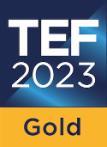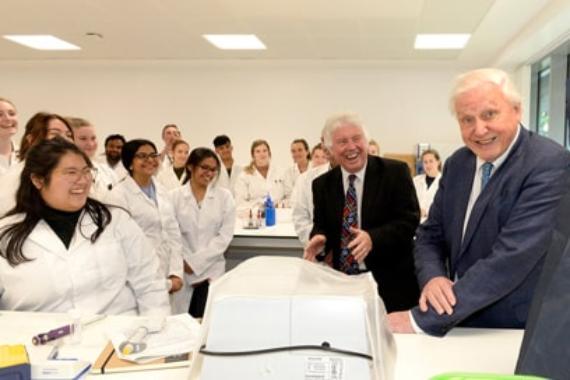Microbiology and Immunology - BSc (Hons)
Our Microbiology and Immunology BSc explores two fascinating and complementary areas of contemporary bioscience. From the biology, biochemistry and physiology of viruses and microorganisms to understanding the immune system in defending the body against infection, you will acquire the knowledge that paves the way for new biotechnological approaches to disease treatment and prevention.
Year of entry
- 2025
Course type
- Single Honours
UCAS code
- C501
Duration of study
- 3 years / 4 years with international or placement year
Why study Microbiology and Immunology at Keele University?
Teaching Excellence Framework GOLD

Keele University has been awarded the highest rating of gold in the teaching excellence framework (TEF), 2023. The TEF assessment identifies excellence in the educational experience and outcomes of our students, focusing on all undergraduate courses and students.
Additional opportunities
There are a range of additional opportunities available when studying this course.
Please note, undertaking one may impact upon the availability of another.
Entry requirements
The following section details our typical entry requirements for this course for a range of UK and international qualifications. If you don’t see your qualifications listed, please contact us to find out if we can accept your qualifications. If you don't think you'll meet the entry requirements specified, you may be able to gain entry to this course via a Foundation Year.
Typical offer
Please ensure that you read the full entry requirements by selecting your qualifications from the dropdown menu below. This will include any subject specific, GCSE/Level 2 Maths, and English language requirements you may need.
Please select your qualification from the drop-down list below for the full entry requirement information
A Level
ABB in three A Levels including B in two Science subjects from the Keele Defined Sciences List.
Contextual Offer: BBC in three A Levels including B in two Science subjects from the Keele Defined Sciences List.
You will also need: 4 / C in GCSE Maths or Level 2 Functional Skills Maths, plus an English language qualification (see below).
BTEC Extended Diploma / National Extended Diploma
DDM in any of the following BTEC Extended Diplomas / National Extended Diplomas: Applied Science, Health and Social Care.
Contextual Offer: DMM in any of the following BTEC Extended Diplomas / National Extended Diplomas: Applied Science, Health and Social Care.
You will also need: 4 / C in GCSE Maths or Level 2 Functional Skills Maths, plus an English language qualification (see below).
BTEC National Diploma / Diploma
Distinction and Merit in Applied Science or Health and Social Care BTEC National Diploma / Diploma and B in one Science A Level from the Keele Defined Sciences List.
You will also need: 4 / C in GCSE Maths or Level 2 Functional Skills Maths, plus an English language qualification (see below).
BTEC National Extended Certificate / Subsidiary Diploma
Distinction in any BTEC National Extended Certificate / Subsidiary Diploma and BB in two Science A Levels from the Keele Defined Sciences List, or Distinction in Applied Human Biology, Applied Science, or Health and Social Care BTEC National Extended Certificate / Subsidiary Diploma and BB in two A Levels including one Science A Level from the Keele Defined Sciences List.
You will also need: 4 / C in GCSE Maths or Level 2 Functional Skills Maths, plus an English language qualification (see below)
T Level
Distinction in any of the following T Levels: Health, Healthcare Science, Science.
You will also need: 4 / C in GCSE Maths or Level 2 Functional Skills Maths, plus an English language qualification (see below).
International Baccalaureate Diploma
655 in Higher Levels including two Science subjects from the Keele Defined Sciences List at Higher Level, or 32 points including two Higher Level Science subjects from the Keele Defined Sciences List.
Contextual Offer: 554 in Higher Levels including 5 in two Science subjects from the Keele Defined Sciences List at Higher Level, or 29 including 5 in two Higher Level Science subjects from the Keele Defined Sciences List.
You will also need: 4 / C in GCSE Maths or Level 2 Functional Skills Maths, or 3 in IB Middle Years Maths, or 3 in IB Diploma Standard Level Maths (any), plus an English language qualification (see below).
International Baccalaureate Career-Related Programme
We encourage applications with the IBCP but recognise that your combination of qualifications may differ depending on where you are studying.
If you are taking a BTEC National Diploma / Diploma with one or more Higher Levels, your offer will be similar to our BTEC + A Level offer (see 'BTEC National Diploma / Diploma') but with an HL requirement of 6 for A, 5 for B, or 4 for C.
For any other combination, please contact the University Admissions Team for advice.
Access to HE Diploma
128 UCAS points in a Computing, Engineering, Health, Nursing, Medicine, Science, or Sports Access to HE Diploma including Distinction in at least 30 Level 3 credits and Merit in at least 15 Level 3 credits.
You will also need: 4 / C in GCSE Maths or Level 2 Functional Skills Maths, plus an English language qualification (see below).
Welsh Baccalaureate / Bagloriaeth Cymru
The Advanced Skills Challenge Certificate is equivalent to one full A Level at the same grade and can be included alongside 2 other A Levels in a standard A Level offer for this course (see A Level). All subject specific requirements will still need to be met.
Scotland - Highers and Advanced Highers
BBBBC in five Highers including two Higher Science subjects from the Keele Defined Sciences List, or BC in two Advanced Highers and CC in two Highers including two Higher or Advanced Higher Science subjects from the Keele Defined Sciences List, or BCC in three Advanced Highers including two Advanced Higher Science subjects from the Keele Defined Sciences List.
You will also need: C in National 5 Maths, or 4 / C in GCSE Maths or Level 2 Functional Skills Maths, plus an English language qualification (see below).
Extended Project Qualification (EPQ)
If you have B or higher in the EPQ and are studying A Levels, BTEC, the International Baccalaureate Diploma, or an Access to HE Diploma, you will typically receive an alternative offer which will be lower than the standard offer. Please see 'Alternative and contextual offers' below.
Core Maths
If you have B or higher in Core Maths and are studying A Levels, BTEC, the International Baccalaureate, or an Access to HE Diploma, you will typically receive an alternative offer which will be lower than the standard offer. Please see 'Alternative and contextual offers' below.
Ireland - Leaving Certificate
H3, H3, H3, H4, H4, H4 in the Irish Leaving Certificate including H4 in two subjects from the Science or Applied Science Groups.
You will also need: O4 / H6 in Maths, plus an English language qualification (see below).
China - Gaokao
75% in the Gaokao including 70% in two of Maths, Physics, Biology or Chemistry.
You will also need: 60% in Senior Secondary School or Gaokao Maths, plus an English language qualification (see below).
India - Standard XII
Average of 75% from four subjects including 70% in two of Maths, Physics, Chemistry or Biology in the ICSE, CBSE or Western Bengal Standard XII, or average of 80% from four subjects including 75% in two of Maths, Physics, Chemistry or Biology in any other Standard XII.
You will also need: 6 or C2 in Secondary School Examination Maths, or Pass in Standard XII Maths, plus an English language qualification (see below).
Germany - Abitur
2.0 overall average in the Abitur including 12 in two of Geography, Psychology, Maths, Physics, Biology, Chemistry, Computer Science, Technology, Nutritional Science or Sports.
You will also need: 10 in Maths in the Abitur, plus an English language qualification (see below).
France - Baccalaureate
14 in the French Baccalaureate / International Option Baccalaureate including 14 in two of Chemistry / Physics, Maths, Science, Sport, Engineering Sciences, Life and Earth Sciences or Information Technology, or 13 in the Baccalauréat Français International including 13 in two of Chemistry / Physics, Maths, Science, Sport, Engineering Sciences, Life and Earth Sciences or Information Technology.
You will also need: 10 in Maths in the Baccalaureate, plus an English language qualification (see below).
Hong Kong - Diploma
544 from two electives and one core subject in the HKDSE including 4 in two of Maths, Physics, Biology, Chemistry, Geography, Design and Applied Technology, ICT or Physical Education.
You will also need: 2 in HKDSE Maths, plus an English language qualification (see below).
Spain - Bachillerato
Overall average of 7.8 in the Título de Bachillerato including 8 in two of Chemistry, Maths, Biology, Physics, Geology, Geography, Earth Sciences and Environmental Sciences, Psychology, Industrial Technology or ICT.
You will also need: 5 in Graduado en Educación Secundaria (GES) Maths or 6 in Título de Bachiller Maths, plus an English language qualification (see below).
Italy - Diploma di Esame di Stato
85% in the Esame di Stato including 8 in two of Chemistry, Maths, Natural Science, Geography, Physical Education, or ICT.
You will also need: 5 in Maths in the Diploma, plus an English language qualification (see below).
Cyprus - Apolytirion
18.5 / 88% in the Apolytirion including 18 in two of Chemistry, Biology, Computer Science, Design and Technology, Information Technology, Geography, Maths, Physical Education or Physics.
You will also need: 14 in Maths in the Apolytirion, plus an English language qualification (see below).
Portugal
Overall average of 16 in a Secondary Certificate including 16 in two of Chemistry, Maths, Biology, Physics, Geology, Geography, Computer Applications, Psychology, Physical Education.
You will also need: 10 in Secondary Certificate Maths, plus an English language qualification (see below).
Canada - Diploma
70% / BBBBC in five courses in the Grade 12 Diploma including 70% in two of Advanced Functions, Biology, Calculus and Vectors, Chemistry, Computer Science, Maths of Data Management or Physics.
You will also need: 50% in Grade 11 Maths, plus an English language qualification (see below).
Kenya - KCSE / Diploma
We do not accept the Kenya Certificate of Secondary Education for direct entry. However, you can apply to study an International Foundation Year at Keele University International College. On successful completion, you can progress to an undergraduate degree at Keele.
We may accept a two year Diploma. Please contact the University Admissions Team for advice.
Nigeria - Senior School Certificate / OND
We do not accept the Senior School Certificate (WAEC or NECO) for direct entry. However, you can apply to study an International Foundation Year at Keele University International College. On successful completion, you can progress to an undergraduate degree at Keele.
We may accept an Ordinary National Diploma with GPA of 2.5 or a Merit / Lower Credit. Please contact the University Admissions Team for advice.
USA - Advanced Placement
544 from three Advanced Placement subjects including 4 in two of Chemistry, Calculus (either), Physics (any), Biology, Computer Science (either), Environmental Science, Psychology or Statistics.
You will also need: C in Grade 12 High School Diploma Maths, plus an English language qualification (see below).
Ghana
We do not accept the West African Senior School Certificate Examination for direct entry. However, you can apply to study an International Foundation Year at Keele University International College. On successful completion, you can progress to an undergraduate degree at Keele.
Sri Lanka - Advanced Level
ABB in three Advanced Levels including B in two of Combined Maths, Chemistry, Physics, ICT, Biology or Agricultural Science.
You will also need: C in O-Level Maths, plus an English language qualification (see below).
Malaysia - STPM
ABB in three Principal Level subjects in the STPM including B in two of Maths, ICT, Physics, Biology, Chemistry, Geography, or Sports Science.
You will also need: C in SPM Maths, plus an English language qualification (see below).
Pakistan - Secondary School Certificate
We do not accept the Secondary School Certificate for direct entry. However, you can apply to study an International Foundation Year at Keele University International College. On successful completion, you can progress to an undergraduate degree at Keele.
Singapore - A Levels (H2)
ABB in three H2 Levels including B in two of Chemistry, Biology, Physics, Computing, Maths, Further Maths or Geography.
You will also need: C in O-Level Maths, plus an English language qualification (see below).
European Baccalaureate
75% overall with 7 in two of Chemistry, Maths (3 or 5 period), Physical Education, Biology (2 or 4 period), Geography (2 or 4 period), or Physics.
You will also need: 6 in European Baccalaureate Maths, plus an English language qualification (see below).
NCUK
Pass NCUK Foundation Year with ABB including B in two Science subjects from the Keele Defined Sciences List.
Grade C in EAP English Language module.
You will also need: 4 / C in GCSE Maths or international equivalent.
Uganda - Advanced Certificate of Education
ABB in three Principal Level subjects in the Advanced Certificate of Education including B in two of Chemistry, Maths, Physics, Biology, or Geography.
You will also need: 6 in UACE or UCE Maths, plus an English language qualification (see below).
Zimbabwe - Advanced Level GCE
ABB in three Advanced Level subjects including B in two of Additional Maths, Agriculture, Animal Science, Biology, Building Technology, Chemistry, Computer Science, Crop Science, Food Technology and Design, Geography, Horticulture, Mechanical Maths, Metal Technology and Design, Physics, Pure Mathematics, Sport Science and Technology, Statistics, or Technical Graphics and Design.
You will also need: 4 / C in GCSE Maths or Level 2 Functional Skills Maths, plus an English language qualification (see below).
English language requirements
All of our courses require an English language qualification or test. For most students, this requirement can be met with a 4 or C in GCSE English. Please see our English Language guidance pages for further details, including English language test information for international students. For those students who require an English language test, this course requires a test from Group A.
Alternative and contextual offers
We're committed to ensuring equality of opportunity to all our applicants with the potential and motivation to succeed, regardless of background. That's why we operate a range of alternative offer schemes with clear eligibility criteria, including contextual offers, offers for those studying within the Keele region, and recognising a range of additional qualifications in your offer.
General information
The entry grades outlined in this section indicate the typical offer which would be made to candidates, along with any subject specific requirements. This is for general information only. Keele University reserves the right to vary offer conditions depending upon a candidate's application.
Gain practical experience in the workplace
In an increasingly competitive job market, employers are seeking to recruit employees who have high-level knowledge, skills and an understanding of the workplace. If you're unsure which area of microbiology and immunology you want to focus on, work experience can provide insight into what work is like in a
specific field.
From a year working in industry and paid internships to summer secondment research placements in the UK or overseas, our programme offers many opportunities to gain familiarisation with the professional working environment, develop professional contacts and apply the skills and theories
you have learnt.
Our expertise
Staff in the School of Life Sciences include world-leading researchers, clinical practitioners and experts in learning and teaching. As part of their training, all staff complete post-graduate courses on learning and teaching. Some take this to Masters level and beyond, choosing to specialise in pedagogic research to ensure that our programmes are taught to the very highest standards.
State-of-the-art facilities
You will carry out practical laboratory work in both The David Attenborough Laboratories and Keele's
state-of-the-art Central Science Laboratory (CSL) building - which is part of the biggest single investment in learning and teaching in the University’s history.
The David Attenborough Laboratories have significantly expanded the School of Life Sciences’ teaching and research areas, and provide two additional state-of-the-art teaching laboratories with space for 120 students between them and two additional research laboratories. The research laboratories will make a significant contribution to the Global Health Initiative at Keele, and will be home to researchers working on neurological disorders including Parkinson’s disease, spinal injury, oncology, viral infections and carbohydrate biochemistry.

Central Science Laboratories
Develop your practical skills in Keele's state-of-the-art Central Science Laboratories
Foundation year
Our Foundation Year provides an excellent alternative route to Keele, providing a unique opportunity to better prepare for your chosen degree, and with guaranteed entry onto your undergraduate course once you successfully complete your Foundation Year.
This extra year of study can improve your academic skills, expand your subject knowledge, give you a better understanding of higher education and, perhaps most importantly of all, build your confidence.
Keele University is consistently ranked among the top universities for student satisfaction, and we have over 70 years' experience of teaching a foundation year to students. On the Keele Foundation Year, you'll study on campus, joining our undergraduate community from the outset, with access to all the facilities and support that you'd get as an undergraduate student at Keele.
The information in this Foundation Year section is for UK/Home applicants. Where an international Foundation Year is available, please see the 'Information for international students' tab.
The information within this page is for students wishing to start their studies in September. If you would like to start this course in January, please visit our January pages for further details.
Course Content
Our Foundation Year allows you to develop your critical thinking, academic reading, writing, and communication study skills along with subject-specific knowledge and skills which will be invaluable in your academic studies and beyond. Upon meeting the progression criteria and successfully completing our Foundation Year, you will automatically progress into your Keele undergraduate degree with the confidence that you have the skills, and knowledge needed to successfully complete your course.
This Foundation Year is a two-semester programme which provides a tailored pre-degree programme of study to better prepare you for the BSc (Hons) Microbiology and Immunology degree. For example, the Foundations of Life Sciences module will look at basic cell biology in terms of structure and function and go on to examine how cells obtain their energy and raw materials. It considers how organisms interact and analyses the effects of climate change on ecosystems. Course content has been developed in collaboration with degree teaching teams, so that by the time you begin Year 1, you will be ready to excel at your studies, as the majority of our Foundation Year students do.
Find out more about the Keele Foundation Year, including information about teaching and assessment methods by visiting the Foundation Year homepage.
Course Structure
The module details given below are indicative, they are intended to provide you with an idea of the range of subjects that are taught to our current students. The modules that will be available for you to study in future years are prone to change as we regularly review our teaching to ensure that it is up-to-date and informed by the latest research and teaching methods. The information presented is therefore not intended to be construed and/or relied upon as a definitive list of the modules available in any given year.
Semester One Core Modules
| FYO-00185 | Practical and Academic Skills in Science | 15 credits |
| FYO-00211 | Foundations in Numerical and Quantitative Methods for Scientists | 15 credits |
| FYO-00189 | Foundations of Chemistry | 15 credits |
| FYO-00197 | Foundations of Life Sciences | 15 credits |
Semester Two Core Modules
| FYO-00199 | Advancing Life Sciences | 30 credits |
| FYO-00191 | Advancing Chemistry | 30 credits |
ENTRY REQUIREMENTS
The entry grades outlined in this section indicate the likely offer or range of offers which would be made to candidates along with any subject specific requirements. This is for general information only. Keele University reserves the right to vary offer conditions depending upon a candidate’s application. Read more about our undergraduate entry requirements.
- 56 UCAS points including at least one Level 3 qualification (such as an A Level, BTEC, Access Courses, or T Level).
- Plus C in GCSE English / Level 2 Functional Skills English and C in GCSE Maths / Level 2 Functional Skills Maths.
How to Apply
Students will need to apply for BSc (Hons) Microbiology and Immunology with Foundation Year (UCAS code C502) through UCAS at www.ucas.com.
Direct Entry Students
If you already have your qualifications, are not expecting any further results and only wish to apply to Keele, please contact the Admissions Office directly.
The information in this Foundation Year section is for UK/Home applicants. Where an international Foundation Year is available, please see the 'Information for international students' tab.
We also offer a January start for some of our Foundation Year courses. Adopting a blended learning approach, the January start is particularly useful for students wishing to return to education following time out of studying, or who are seeking a flexible approach to their Foundation Year studies. Our January start is available across most of our Science, Humanities, Social Science, Health and Business courses.
Whilst still being a full-time course, our blended delivery model combines live teaching sessions - both online and on-campus - with self-directed study, enabling you to predominantly study at a time that suits your lifestyle. You will benefit from weekly online taught sessions which encourage you to engage with your teachers and peers.
In addition to online study there will be a series of full study days that you will be required to attend throughout each semester. These sessions may include lab-based activities, group work, review of course and assessment materials studied online. They will emphasise opportunities for you to deepen your knowledge and understanding of your chosen route.
Please refer to the September start tab for more information about the entry requirements and what you will study. The modules that you will take on a January start Foundation Year will be similar to those for the September start, but on a compressed timescale and tailored to a blended learning approach (with the majority of learning taking place online).
For more information, including fees, the UCAS code for this course, how to apply, and how you will be taught, please visit our January Start Foundation Year webpage.
Our International Foundation Year is delivered on campus through Keele University International College (KUIC). Find out more about the International Foundation Year options on the KUIC website.
Discover the Keele difference
Everything’s on your doorstep at Keele, and you’ll soon feel at home and make friends wherever you go.
We help students manage their money and ensure that they receive any funding for which they may be eligible.
Make yourself more employable after graduation by taking advantage of the whole host of additional opportunities.





